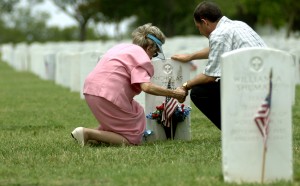I hope that you were able to watch or listen to at least some of The Church of Jesus Christ of Latter-Day Saints’ semi-annual General Conference on April 4-5, 2009. During these conferences the general officers and leaders of our church speak on a variety of issues that they feel the world needs to hear.
There are two things that strike me over and over again as I listen to these men and women speak at these general conferences twice each year; first, that they do prophesy and their prophecies are fulfilled and second, despite the enormous amount of evil and bad there is in the world, they remain utterly optimistic and grateful. I would like to share part of one of President Monson’s (our beloved prophet) addresses, “Be of Good Cheer”, which he delivered on Sunday morning. As I watched him deliver this address I couldn’t help but think about how utterly blessed I am and that I have not had to suffer one ounce compared to others. I am sure that there are hard times that I have yet to experience, but I am so grateful to God for how he has watched over, protected me, and blessed me beyond measure. While this story doesn’t directly apply to me, the meaning is still there–remain hopeful and committed to God even when it is harder than you ever imagined. I hope that the Holy Ghost will touch you while you read this excerpt as He did me as I listened to President Monson. For a video feed of the entire conference, you can click here.

“Since last we met together in a general conference six months ago, there have been continuing signs that circumstances in the world aren’t necessarily as we would wish. The global economy, which six months ago appeared to be sagging, seems to have taken a nosedive, and for many weeks now the financial outlook has been somewhat grim. In addition, the moral footings of society continue to slip, while those who attempt to safeguard those footings are often ridiculed and, at times, picketed and persecuted. Wars, natural disasters, and personal misfortunes continue to occur.
It would be easy to become discouraged and cynical about the future—or even fearful of what might come—if we allowed ourselves to dwell only on that which is wrong in the world and in our lives. Today, however, I’d like us to turn our thoughts and our attitudes away from the troubles around us and to focus instead on our blessings as members of the Church. The Apostle Paul declared, “God hath not given us the spirit of fear; but of power, and of love, and of a sound mind.”1
None of us makes it through this life without problems and challenges—and sometimes tragedies and misfortunes. After all, in large part we are here to learn and grow from such events in our lives. We know that there are times when we will suffer, when we will grieve, and when we will be saddened. However, we are told, “Adam fell that men might be; and men are, that they might have joy.”2
How might we have joy in our lives, despite all that we may face? Again from the scriptures: “Wherefore, be of good cheer, and do not fear, for I the Lord am with you, and will stand by you.”3
. . . The setting for my final example of one who persevered and ultimately prevailed, despite overwhelmingly difficult circumstances, begins in East Prussia following World War II.
In about March 1946, less than a year after the end of the war, Ezra Taft Benson, then a member of the Quorum of the Twelve, accompanied by Frederick W. Babbel, was assigned a special postwar tour of Europe for the express purpose of meeting with the Saints, assessing their needs, and providing assistance to them. Elder Benson and Brother Babbel later recounted, from a testimony they heard, the experience of a Church member who found herself in an area no longer controlled by the government under which she had resided.
She and her husband had lived an idyllic life in East Prussia. Then had come the second great world war within their lifetimes. Her beloved young husband was killed during the final days of the frightful battles in their homeland, leaving her alone to care for their four children.
The occupying forces determined that the Germans in East Prussia must go to Western Germany to seek a new home. The woman was German, and so it was necessary for her to go. The journey was over a thousand miles (1,600 km), and she had no way to accomplish it but on foot. She was allowed to take only such bare necessities as she could load into her small wooden-wheeled wagon. Besides her children and these meager possessions, she took with her a strong faith in God and in the gospel as revealed to the latter-day prophet Joseph Smith.
She and the children began the journey in late summer. Having neither food nor money among her few possessions, she was forced to gather a daily subsistence from the fields and forests along the way. She was constantly faced with dangers from panic-stricken refugees and plundering troops.
As the days turned into weeks and the weeks to months, the temperatures dropped below freezing. Each day, she stumbled over the frozen ground, her smallest child—a baby—in her arms. Her three other children struggled along behind her, with the oldest—seven years old—pulling the tiny wooden wagon containing their belongings. Ragged and torn burlap was wrapped around their feet, providing the only protection for them, since their shoes had long since disintegrated. Their thin, tattered jackets covered their thin, tattered clothing, providing their only protection against the cold.
Soon the snows came, and the days and nights became a nightmare. In the evenings she and the children would try to find some kind of shelter—a barn or a shed—and would huddle together for warmth, with a few thin blankets from the wagon on top of them.
She constantly struggled to force from her mind overwhelming fears that they would perish before reaching their destination.
And then one morning the unthinkable happened. As she awakened, she felt a chill in her heart. The tiny form of her three-year-old daughter was cold and still, and she realized that death had claimed the child. Though overwhelmed with grief, she knew that she must take the other children and travel on. First, however, she used the only implement she had—a tablespoon—to dig a grave in the frozen ground for her tiny, precious child.
Death, however, was to be her companion again and again on the journey. Her seven-year-old son died, either from starvation or from freezing or both. Again her only shovel was the tablespoon, and again she dug hour after hour to lay his mortal remains gently into the earth. Next, her five-year-old son died, and again she used her tablespoon as a shovel.
Her despair was all consuming. She had only her tiny baby daughter left, and the poor thing was failing. Finally, as she was reaching the end of her journey, the baby died in her arms. The spoon was gone now, so hour after hour she dug a grave in the frozen earth with her bare fingers. Her grief became unbearable. How could she possibly be kneeling in the snow at the graveside of her last child? She had lost her husband and all her children. She had given up her earthly goods, her home, and even her homeland.
In this moment of overwhelming sorrow and complete bewilderment, she felt her heart would literally break. In despair she contemplated how she might end her own life, as so many of her fellow countrymen were doing. How easy it would be to jump off a nearby bridge, she thought, or to throw herself in front of an oncoming train.
And then, as these thoughts assailed her, something within her said, “Get down on your knees and pray.” She ignored the prompting until she could resist it no longer. She knelt and prayed more fervently than she had in her entire life:
“Dear Heavenly Father, I do not know how I can go on. I have nothing left—except my faith in Thee. I feel, Father, amidst the desolation of my soul, an overwhelming gratitude for the atoning sacrifice of Thy Son, Jesus Christ. I cannot express adequately my love for Him. I know that because He suffered and died, I shall live again with my family; that because He broke the chains of death, I shall see my children again and will have the joy of raising them. Though I do not at this moment wish to live, I will do so, that we may be reunited as a family and return—together—to Thee.”
When she finally reached her destination of Karlsruhe, Germany, she was emaciated. Brother Babbel said that her face was a purple-gray, her eyes red and swollen, her joints protruding. She was literally in the advanced stages of starvation. In a Church meeting shortly thereafter, she bore a glorious testimony, stating that of all the ailing people in her saddened land, she was one of the happiest because she knew that God lived, that Jesus is the Christ, and that He died and was resurrected so that we might live again. She testified that she knew if she continued faithful and true to the end, she would be reunited with those she had lost and would be saved in the celestial kingdom of God.8
From the holy scriptures we read, “Behold, the righteous, the saints of the Holy One of Israel, they who have believed in [Him], they who have endured the crosses of the world, . . . they shall inherit the kingdom of God, . . . and their joy shall be full forever.”9
I testify to you that our promised blessings are beyond measure. Though the storm clouds may gather, though the rains may pour down upon us, our knowledge of the gospel and our love of our Heavenly Father and of our Savior will comfort and sustain us and bring joy to our hearts as we walk uprightly and keep the commandments. There will be nothing in this world that can defeat us.
My beloved brothers and sisters, fear not. Be of good cheer. The future is as bright as your faith.
I declare that God lives and that He hears and answers our prayers. His Son, Jesus Christ, is our Savior and our Redeemer. Heaven’s blessings await us. In the name of Jesus Christ, amen.”
 To the first part, no; we do not pray to the dead. We pray to God the Eternal Father. We believe in His Son, Jesus Christ and we end our prayers in Jesus’ name. We believe that the Father and the Son are both very much alive.
To the first part, no; we do not pray to the dead. We pray to God the Eternal Father. We believe in His Son, Jesus Christ and we end our prayers in Jesus’ name. We believe that the Father and the Son are both very much alive. Q. How do you pray?
Q. How do you pray?

